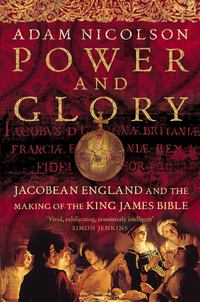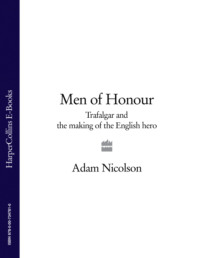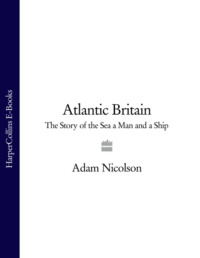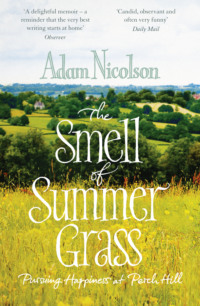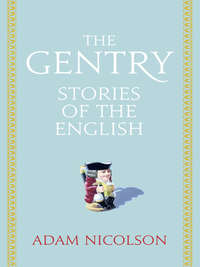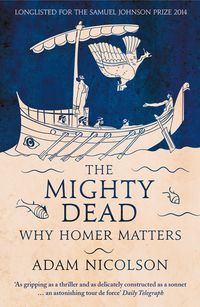
Полная версия
The Making of Poetry: Coleridge, the Wordsworths and Their Year of Marvels
The Coleridges had dreamed of a perfect rural retreat in which the consolations of nature, a bit of ground to cultivate and vegetables to grow, would provide the life in which Hartley could blossom and his parents could be happy. They had been promised for a moment a beautiful little smallholding in the valley at Adscombe, the far side of Over Stowey and just under the Quantocks, but that had fallen through, and Lime Street was all that was on offer. It was scarcely the place for bliss, but as one of their visitors wrote to his sister, ‘Here you can be happy without superfluities. Coleridge has a fine little boy about nine or ten months old. This child is a noble, healthy-looking fellow, has strong eyebrows and beautiful eyes. It is a treat, a luxury, to see Coleridge hanging over his infant and talking to it, and fancying what he will be in future days.’
Without doubt, gaiety rollicked around the house, for all their poverty and discomfort, toothache and neuralgia, and for all Coleridge’s habit of walking up and down, ‘composing poetry, instead of coming to bed at proper hours’. Among their friends this was a time of real delight, of games and laughter, of cups of flip and jugs of cider. Anna and John Cruikshank, the son of the Earl of Egmont’s steward and an admirer of Coleridge, had a child the same age as Hartley and often had them to supper at Ivy Cottage in Castle Street. Sara was friends with Mrs Roskilly, whose husband, the curate, ‘a most amiable liberal-minded man’, ran the boarding school. James Cole the watchmaker and his wife, John Brice the vicar of Aisholt, a beautiful green hamlet on the edge of the hills, and his daughters, and a whole family of Chesters, John and his sisters, all welcomed them in.
These were the more democratically-minded of Stowey’s inhabitants, the free thinkers, those for whom events in France and on the Continent had not been mere catastrophe. The conservative elements of the town continued to dislike and suspect the Coleridges. One Stowey woman thought Coleridge ‘an absent-minded, opinionated man, talking everybody down, fatiguing to listen to’, while William Holland, the diary-keeping rector of Over Stowey, despised anyone who associated with them.
The worlds of the Georgian vicar and the Romantic poets collide on the very first page of the earliest surviving volume of Holland’s diary, from October 1799. He and his wife Mary have gone shopping for a gown at Frank Poole’s ‘every-thing shop’ in St Mary’s Street, where, as usual, the unctuous Mr Poole ‘smiled and bowed graciously’. Then:
Saw that Democratic hoyden Mrs. Coleridge, who looked so like a frisky girl or something worse that I was not surprised that a Democratic libertine should choose her for a wife. The husband gone to London suddenly – no one here can tell why.
Here, from nowhere, a glimpse of the hostile world in which the poets were living. Hoyden – rude, rough, dirty, saucy, immodest, whorish, sexual, self-sufficient, not submitting to the requirements of social deference or feminine modesty. Frisky – only ever used elsewhere by Holland of horses that had not been adequately exercised. Something worse – salacious talk of the Fricker girls’ sexual mores in Bristol and in London, where, in another euphemism, they had been described as ‘haberdashers’, had reached Stowey. Democratic – suspect, Francophile, eroding all that Holland valued most. Libertine – the fusion of the worst sexual and political freedoms. No one here can tell why – the hostile, supervisory talk in the street. The reality was that the Coleridge marriage was in crisis and ‘the husband’ had gone north to see the Wordsworths.

Sally Pally
What in the end emerges from this cascade of disapproval? The alluring freedom, directness and attractiveness of Sara Coleridge in 1799, a liberty woman in a closed and controlling world. Coleridge when he loved her called her ‘Sally Pally’, and it is Sally Pally Coleridge one should think of walking the streets of Nether Stowey, indifferent to the sneers of its inhabitants. When Southey, in the midst of a ferocious row with her husband, pouring ‘heart-chilling sentiments’ into the room, had claimed that he liked Coleridge more than ever, Sara ‘affronted [him] into angry Silence by exclaiming What a Story!’ It is one of the ironies of this year, so carefully and agonisingly dedicated to the finding and telling of truths, that one of its principal truth-tellers was excluded from its inner circle.
Coleridge loved the Quantocks, but the centre of Nether Stowey for him, and the reason he was there, was neither a landscape nor a building but a man. Tom Poole was a tanner, in his mid-thirties, the son of a tanner and entirely self-educated, bright-eyed, ‘not of a yielding disposition’, and with a rough and abrupt manner that he never attempted to refine or conceal.
In the early 1790s he had read The Rights of Man by Tom Paine and had been radicalised by the news from France. A network of Pooles – lawyers, landowners, men of the cloth, ‘the very top of the yeomanry’, the Reverend Holland called them – was spread across Stowey, Bridgwater and the neighbouring villages. Except for Tom’s brother Richard, most of them disapproved of him. His cousin Charlotte bristled with resentment: ‘Tom Poole,’ she told her journal, ‘has imbibed some of the wild notions of liberty and equality that at present prevail so much.’ He had set up a book society in Stowey, and when Richard Symes, a Bridgwater lawyer, found a young man with a copy of The Rights of Man given to him by Poole, he tore it from his hand and stamped it to shreds on the pavement of Castle Street. Effigies of Tom Paine had been burned in Bridgwater and Taunton, and after Poole prevented the same being done in Stowey, stories ran around the rumour-networks of his town that he was now distributing seditious pamphlets. There is no doubting his radicalism. It went much further than a simple concern for the poor of Somerset. When war broke out against France he was unequivocal:
Many thousands of human beings will be sacrificed in the ensuing contest; and for what? To support three or four individuals, called arbitrary kings, in the situation which they or their ancestors have usurped. I consider every Briton who loses his life in the war as much murdered as the King of France, and every one who approves the war, as signing the death warrant of each soldier or sailor that falls.
He tormented Stowey with his democratic sentiments. He talked politics when out shooting woodcock. He thought England ‘a declining country, too guiltily leagued with despots’. He told whoever would listen that if he ever had a son he would call him John Hampden, after the great seventeenth-century revolutionary, and was always ready to have some good radical talk in his parlour, providing a comfortable and well-stocked book room in his own house for Coleridge and others to read and write in, helping with his mother – another committed radical – to make the new radical hotbed of the cottage in Lime Street as comfortable as he could. To his cousin Charlotte, he was a propagandist. She thought he always wanted ‘to load the higher class of people indiscriminately with opprobrium, and magnifies the virtues, miseries, and oppressed state of the poor in proportion’.
Not surprisingly, Poole started to come to the attention of the government’s spy networks. His letters were secretly opened and their contents reported to Whitehall. A Bridgwater friend told him that he was
considered by Government as the most dangerous person in the county of Somerset, and, as it was well known that this part of the country was disaffected, the whole mischief was, by Government, attributed to me.
Poole laughed at the idea, but his tone was bitter. ‘Now an absolute controul exists,’ he wrote. The souls of Englishmen were ‘as much enslaved as the body in the cell of a Bastile’. That is not far short of revolutionary talk, and William Holland knew him as the enemy:
Met the patron of democrats, Mr Thomas Poole, who smiled and chatted a little. He was on his gray mare, Satan himself cannot be more false and hypocritical … very grand and important, took out his French gold watch and affected much the travelled man, coxcomby and with all the appearance of greatness and liberality he is the most shabby dodging man to deal with I ever met … a selfish vain artful man.
There was undoubtedly a touch of self-importance about Poole. ‘For these opinions I would willingly go to the Tower,’ he once said at a meeting in Nether Stowey. ‘The Tower indeed!’ came from the corner of the room. ‘I should think Ilchester Gaol would do for you.’ And not unlike Joseph Cottle, the Bristol bookseller, Poole was entranced when the brilliant young radical poets turned up in Somerset. He had met Coleridge and Southey in 1794 when they were on a walking tour, scandalising the good people of Stowey by the violence of their principles, claiming that Robespierre was a ministering angel of mercy, sent to slay thousands so that he could save millions. Southey had laid his head on the table in one Poole house and declared that he would rather hear of the death of his own father than the death of Robespierre, a gesture which would have been less effective if his audience had known that Southey’s father was already dead.
The Somerset tanner, concerned for the wellbeing of his people, on the good side of the increasingly polarised political divide, full of admiration and reverence for the genius of the young, also appealed to the poets. They saw in him, with a certain gentlemanly condescension, a version of the ideal man who would later appear in Wordsworth’s lyrics, above all as the good shepherd Michael, ‘stout of heart, and strong of limb’.
It was an idealisation of Poole in which Poole himself was prepared to play his part, arranging for six or seven of his friends to subscribe £40 a year for seven years to save Coleridge from hackwork and encourage him to write the great works that were surely in him.
Poole was the equivalent, as a man, of what the Quantocks could offer as a place. He was an amalgam of the safe and the free, reliable, practical, enfolding but enlarging, no intellectual rival, but radically minded and providing a bower of friendship, a kind of organic rootedness in which liberty and poetry could blossom. ‘Where am I to find rest!’ Coleridge had written to him before coming to live in Stowey, when for a few days it looked as if Poole would be unable to find him a house nearby. The answer Coleridge arrived at was: only when I am with you. ‘I adhere to Stowey,’ he wrote imploringly. Without it, and without him, Coleridge thought he would be ‘afloat on the wide sea unpiloted & unprovisioned’. Poole was the home and harbour Coleridge needed and longed for.
The year in the Quantocks was not a question of a few gentle strolls in a charming corner of England, but setting up a colony of radical hope, ‘a small company of chosen individuals’, in Coleridge’s phrase, embracing more than politics could ever embrace, thinking that with the writing of a poetry that was true to the beatings of the heart, with working in the garden, days spent out on the high tops and evenings in the lush richness of the midsummer combes, some kind of change could be wrought in the soul of England.
This was the cluster of ideas-in-a-place to which Coleridge brought Wordsworth and Dorothy in early July 1797. Their arrival was only one part of his more general gathering of friends and allies. It was not to be a lonely year. He had Poole there already. Soon to come was Charles Lamb, his great and brilliant boyhood friend from his school days at Christ’s Hospital in London. Also walking down from London was a man he knew only by correspondence, John Thelwall, famous across England for his radical lectures, his still more famous treason trial of 1794, at which he had been acquitted, and his continuing harassment and persecution by the spy system of the Home Office and its attendant bullies. There was a chance that Robert Southey, Sara Coleridge’s brother-in-law, would also come, with her sister Edith. Coleridge had broken with Southey, but it was to him that he was continuing to write his most intellectualised of letters. The Wedgwood brothers, the Pinneys, his Bristol publisher John Cottle, his unstable pupil and protégé Charles Lloyd – all were to be swept into the Coleridgean embrace. Nether Stowey in his mind was to be a nest of nightingales, singing for the future.
Just how the Wordsworths, the Coleridges, Lamb, Hartley, Nanny and Mrs Rich were crowded into the tiny house, with the prospect of all these others in the offing, is difficult to imagine. At least there was the outside, the vegetable patch and orchard with the leaning tree, the gate and lane at the back leading to Tom Poole’s house and garden. There Poole had built a rustic summer house made of slabs of oak bark, with a jasmine trained over them, all under the shade of a lime tree – nothing more richly or thickly honey-scented in early summer – and with four big elms ballooning above them. Beyond that were the hills and the combes. The Quantocks beckoned them that July. It scarcely rained, just over an inch in the whole month, with one dry day succeeding another. The thermometer stood above seventy degrees Fahrenheit on more than twenty of those July afternoons, occasionally climbing into the eighties, and with hot nights to follow.
It was a recipe for English summer freedom. Sometimes the walks were solitary, Wordsworth and Dorothy exploring the world Coleridge had brought them to, Coleridge going out on his own, but often all of them went, six or seven of them heading out into the hills. There was nothing inherently odd about this kind of walking. As William Holland repeatedly described, everybody walked, and not only the poor who had no choice. Errand boys did indeed ‘walk from place to place on messages’, and one man walked all the way from London to Over Stowey to get a marriage licence, but gentry neighbours also walked to visit each other, or to have tea, to give people news or to deliver the newspaper whose subscription they shared, up the hill to look at the ships in the Bristol Channel with the spying glass, for picnics, with children to look for birds’ nests, in the dusk or the early morning, or ‘after supper by a fine moonlight’. Husbands and wives, children and young women all went walking on the lanes and paths of the parish.
Walking could be preferable ‘to the jogging of the cart’, or a pleasure in itself: ‘After dinner the young nymphs took a walk … I walked home by the light of the good moon.’ A ‘trudge’ in the snow, or at night with a lantern, or in the rain with an umbrella, were all part of everyday life. In bad weather the women wore pattens, high-soled wooden overshoes to keep the ordinary shoes dry and above the mud, and men heavy boots.
And so, soon after their arrival, the Wordsworths sauntered off on their own. Coleridge had judged them right. Dorothy suddenly expanded into all-enveloping enthusiasm for a country that felt like a mild version of their childhood mountains, even with woods that seemed to match those that had belonged to the Earl of Lonsdale, who had cheated them of their inheritance for so long:
… There is everything here; sea, woods wild as fancy ever painted, brooks clear and pebbly as in Cumberland, villages so romantic; and William and I, in a wander by ourselves, found out a sequestered waterfall in a dell formed by steep hills covered with full-grown timber trees. The woods are as fine as those at Lowther, and the country more romantic; it has the character of the less grand parts of the neighbourhood of the Lakes …
They had rambled as far as a large seventeenth- and eighteenth-century house, Alfoxden, hipped roof, wide cornice, far-gazing windows, in a large park, with seventy head of deer grazing and browsing around it. The sequestered waterfall was in the dell or combe or glen that formed the eastern boundary of the park, with the village of Holford on the far side. It turned out that the house was for rent – its owner, a St Albyn, was a minor, away as an undergraduate at Balliol College, Oxford, and the Wordsworths could have it for £23 a year, taxes included. Tom Poole made the arrangements, and the lease was signed.
‘The house is a large mansion, with furniture enough for a dozen families like ours,’ Dorothy told her childhood friend Mary Hutchinson.
There is a very excellent garden, well stocked with vegetables and fruit. The garden is at the end of the house, and our favourite parlour, as at Racedown, looks that way. In front is a little court, with grass plot, gravel walk, and shrubs; the moss roses were in full beauty a month ago. The front of the house is to the south, but it is screened from the sun by a high hill which rises immediately from it. This hill is beautiful, scattered irregularly and abundantly with trees, and topped with fern, which spreads a considerable way down it. The deer dwell here, and sheep, so that we have a living prospect. From the end of the house we have a view of the sea, over a woody meadow-country; and exactly opposite the window where I now sit is an immense wood, whose round top from this point has exactly the appearance of a mighty dome. In some parts of this wood there is an under grove of hollies which are now very beautiful. In a glen at the bottom of the wood is the waterfall of which I spoke, a quarter of a mile from the house. We are three miles from Stowey, and not two miles from the sea. Wherever we turn we have woods, smooth downs, and valleys with small brooks running down them through green meadows, hardly ever intersected with hedgerows, but scattered over with trees. The hills that cradle these valleys are either covered with fern and bilberries, or oak woods, which are cut for charcoal … Walks extend for miles over the hill tops, the great beauty of which is their wild simplicity: they are perfectly smooth, without rocks. The Tor of Glastonbury is before our eyes during more than half of our walk to Stowey; and in the park wherever we go … it makes a part of our prospect …
Somehow the Wordsworths had brought their gentlemanliness with them, and had stumbled on a handsome pedimented house, filled with old hangings and ‘covered with the round-faced family portraits of the age of George I and II’, not unlike and actually larger than Racedown, with hints of Lonsdale grandeur. The way in which Dorothy described it to her friend feels nearly like an heiress coming into her own. Her language is virtually without the stock Romantic or even pre-Romantic phrases that would have displayed the fashionable attitudes to place. The only hint in these letters that she is not a straightforward member of the landowning classes is her love of the ‘wild simplicity’ of the hill tops. Otherwise it is a land surveyor’s account, allied to a calm and proprietorial description of an elegant landscape seen as the declaration of a well-ordered life and a contented household. The much-admired, sparkle-eyed observer of the slivers and specks of the natural world, the empathiser with the poor and troubled, the poet of the unnoticed and the everyday, seems to have slipped away here under the manners and modes of the gentleman and the squire.
Perhaps one can see in this the Dorothy who was the source of strength and connection in their lives, who sustained her broken brother, the irrigating woman-brook, ‘seen, heard, felt, and caught at every turn’. Audible in that account is ‘the voice of sudden admonition’ with which she recalled Wordsworth to his ‘office upon earth’, his destiny as a poet. Its authority is unmistakable. None of this was coming from Wordsworth himself, and in the months that followed, that ownership of settled beauty was the very opposite of what Wordsworth himself would find here.
Alfoxden – called by Coleridge ‘All the Foxes Den’ and by most people, dully, Alfoxton – remains a beautiful and haunting place. The house is now decrepit, and the park broken and ragged. It is scarcely visited. Unlike Coleridge’s spruced-up cottage in Nether Stowey, no National Trust care is applied to the flaking and rotting surfaces of these buildings. Little wrens play on the cornices and pied wagtails pick through the gravel where the moss roses used to flower. The roof in places is breaking through, and the paint on the doors looks as if it has been peppered with gunshot. The walled garden is abandoned, and the trees lie collapsed and broken where they have fallen, vast twisted and spiralled chestnuts lying riven on the hillside, as if a war had been fought through them.

Broken Park
That very condition, on a thick summer evening, with the leaves darkening in the dusk, the bats flicking and scouting overhead, and the deer rustling their anxious, hidden bodies somewhere up in the bracken, has over the centuries absorbed, ironically enough, a Wordsworthian atmosphere. Now Alfoxden seems more than ever like his place, with an ancient grandeur, poised and beautifully placed between hill and sea, with its own apron of hedge and field spread out in front of it towards the grey waters of the Bristol Channel to the north. Everywhere the atmosphere is of decay and breakage, as if forgotten, a fraying cloth, a place shut up and shuttered, ragwort on the lawns and marsh thistles in ranks in front of the house like ushers at its death. On the upper edges of the park the rim of beech trees stands waiting for the old beast to lie down.
Allow night to fall here, and memory and hauntedness come easing out of the ground, a dusk in which Alfoxden’s half-ruin summons the sense of marginal understanding, of something growing in significance because only half-seen, which is one of Wordsworth’s lasting gifts to the world. It is easy to imagine that he was like this himself in these years, a man glimpsed but never quite grasped, always a suggestion of a resolution in him, making half-gestures, a raised eyebrow, an almost-smile, so that his whole being appeared more latent than present.
His repeated habit in poetry, and perhaps in speech, was to use the double negative. Pleasures were not unwelcome, sounds not unheard, understandings not ungrasped. Even when he feels, for instance, the ‘mild creative breeze’ lifting within him, the very centre of his being as a poet, he calls it ‘a power/that does not come unrecognised’.
Everything hangs there as a suggestion. The wind of poetry is no more than a breath of stirring air, and Wordsworth only half-knows it for what it is. That half-state, a not-unreality, is the condition of his inner life, his duskiness, and now, through neglect, is the very state that Alfoxden has come to. There are no mathematics here; the two negatives do not cancel each other out, or at least in their mutual cancelling leave the ghost of a third term, something which might have been or might yet be. The mild creative breeze is itself an aspect of the tentative, a half-feeling, a stirring of the inner atmosphere that might or might not be the making of poetry. There is no certainty that it is; nor any that it is not. That very hanging in a qualified neutrality, which smells of something and suggests something but isn’t quite the thing itself, is the revelatory thing. It is the simmering of a presence, not the memory of a presence but the promise of a presence which bears the same relationship to the future as a memory does to the past.
Over the smooth, curved carriage drive leading back to the village, buzzards turn in the wind off the sea. A dog barks in Holford Glen, and in response the buzzards catcall over the dying ashwoods. Looking down from the footbridge, the rocks and all the ferns beside them are invisible under the roof of summer leaves. As Alfoxden drops into its felt-lined dark, I stay up and walk along the easy way through the edge of the park. Miles off to the north, the surge of a westerly swell breaks and draws on the stones at East Quantoxhead.
There is the slightest undulation in the surface of the carriageway, an easy coming and going beneath the trunks of the ancient chestnuts. There is no need for light here. This was the way loved by Wordsworth for its continuousness, a zero space whose fluency of form allowed the steady, uninterrupted and murmured composition of his verses as he walked, a place in which his music could hold sway, the body-rhythm of a man who, in one half of his own self-conception, belonged in the park of a fine house, suited to a naturally Miltonic and magisterial frame of mind. Wordsworth had a powerful sense of his own promise, and, in 1797, of his failure to fulfil it. Alfoxden now is a picture of Wordsworth then. What could be more fitted to this great man in trouble than a house in ruins and a park in greater ruins, along whose lightless paths he must make his way to find the greatness he knows is in him?


